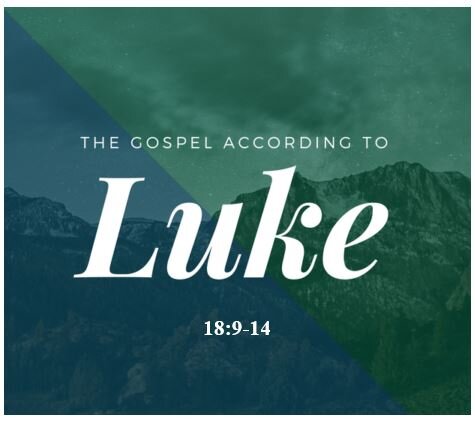BIG IDEA:
APPROACH GOD WITH HUMILITY AND CONFESSION OF THE NEED FOR MERCY RATHER THAN SMUGLY TRUSTING IN YOUR OWN GOOD WORKS
INTRODUCTION:
Having just given instruction on the efficacy of persistent prayer, Jesus wants to make it plain that not all prayer has value. So he develops this contrast between the self-righteous Pharisee who is boasting in his good works and the humble Publican who is seeking mercy and forgiveness of sins. They both go the right place to offer up prayers. They both engage in the same activity of praying. But they come before God with two completely different characters and attitudes. Here we see the right way and the wrong way to approach God.
Lenski: Neither the preceding parable nor the one that is now introduced deal with prayer as such; prayer is only the vehicle in both. So the connection is not from prayer to prayer. The first parable deals with the kind of faith Jesus wants the disciples to have, one that is constantly longing and asking for his return; the second parable adds the true humility of faith, of that faith which alone justifies.
I. (:9) PURPOSE OF THE PARABLE = EXPOSE SELF-RIGHTEOUSNESS
“And He also told this parable to certain ones who trusted in themselves that they were righteous, and viewed others with contempt:”
Anyabwile: It’s amazing how often self-righteousness and looking down on others come in a package.
Steven Cole: The Jews tended to think that being Abraham’s descendants and following the Law of Moses separated them from the Gentile “dogs.” They were a notch above others and would be accepted into heaven because of their Jewish heritage and their moral lives. But Jesus upended that view with this parable.
II. (:10-13) PEOPLE OF THE PARABLE
A. (:10) Two Men Identified
1. Activity
“Two men went up into the temple to pray,”
2. Pharisee
“one a Pharisee,”
3. Tax-Gatherer
“and the other a tax-gatherer.”
B. (:11-13) Two Men Characterized
1. (:11-12) The Pharisee = Self-Righteous – How Not to Approach God
“The Pharisee stood and was praying thus to himself, ‘God, I thank Thee that I am not like other people: swindlers, unjust, adulterers, or even like this tax-gatherer. I fast twice a week; I pay tithes of all that I get.’”
– Very moral man
– Very religious man
J. Ligon Duncan: And there is no sense of that need in this prayer. No sense of a need for forgiveness at all.
Morris: The Pharisee in the parable speaks first of some vices from which he abstains and then of some pious practices in which he engages. . . There is no sense of sin nor of need nor of humble dependence on God.
Geldenhuys: He performs certain exceptional acts of piety: he fasts regularly twice a week (much more frequently than is demanded by the Old Testament laws) and gives tithes of all his income (while the Law requires this of only certain kinds of income).
2. (:13) The Tax-Gatherer = Humble Sinner – How to Approach God
“But the tax-gatherer, standing some distance away, was even unwilling to lift up his eyes to heaven, but was beating his breast, saying, ‘God, be merciful to me, the sinner!’”
Morris: clearly under great conviction of sin. Lifting up the eyes to heaven when praying was normal, but his sense of unworthiness prevented him from doing this.
Anyabwile: He offers no defense, no rationalization, and no justification. He simply admits he is a sinner and needs mercy.
Geldenhuys: as an unconditional avowal of his guilt before the Holy God, he beats upon his breast and beseeches Him to be merciful to him, a sinner – confessing thus that he has no claim to the goodness of God but deserves rather to be cast out and sentenced.
J. Ligon Duncan: The righteousness that comes by God’s mercy alone through the person and work of Jesus Christ received by faith on Him and on His finished work, this mercy alone is the basis by which we are forgiven, accepted, and declared just.
III. (:14) POINT OF THE PARABLE = HUMBLE YOURSELF TO OBTAIN MERCY
A. Result = Justified
“I tell you, this man went down to his house justified rather than the other;”
Anyabwile: The self-righteous Pharisee goes home deceived, believing himself justified, yet unrighteous and unknowing. It is a terrible thing to think you are right before God when you are not. It is foolish to try basing your righteousness with God on the things you do. Our goodness falls far too short. But it is wonderful to be a sinner, head bowed, pleading for mercy, and being rewarded with that mercy through faith in Jesus Christ.
B. Principle – Exalting Self vs. Humbling Self
“for everyone who exalts himself shall be humbled,
but he who humbles himself shall be exalted.”
Lenski: The reason the publican was acquitted and the Pharisee was not is stated in the form of an axiom or self-evident proposition, one that is used repeatedly by Jesus in 14:11; Matt. 23:12, and in other forms elsewhere. . . God had to puncture his arrogance; he could not let the lie endure, especially also since God had provided a true righteousness for sinners, and this man spurned it, manufactured a sham righteousness of his own instead, and tried to pass that off on God.

